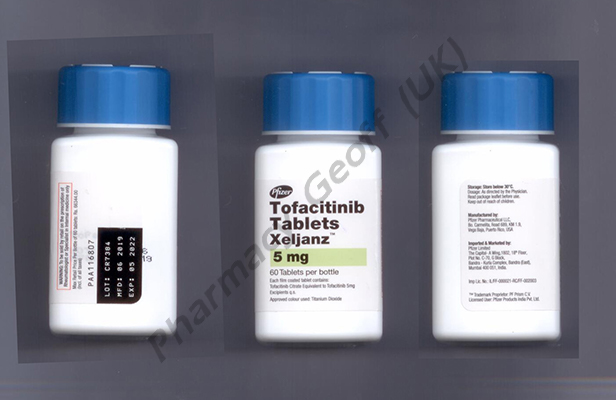
Our price: £990.00
What Is Xeljanz (Tofacitinib)?
Xeljanz (Tofacitinib) is a treatment for moderate to severe rheumatoid arthritis. It is indicated in cases where patients have note reponded to methotrexate or are intolerant to methotrexate. Tofacitinib can be used alone or alongside other medications to treat arthritis. In some situations Tofacitinib is used to treat psoriatic arthritis and ulcerative colitis. Tofacitinib is in a class of medications called Janus kinase (JAK) inhibitors. It works by decreasing the activity of the immune system.
Xeljanz (Tofacitinib) Dosage and Administration
Xeljanz (Tofacitinib) is an oral tablet to be taken by mouth. It is usually taken twice daily and can be taken with or without food. Take only the dosage you have been prescribed by your doctor and follow any other instructions they have given you.
Xeljanz (Tofacitinib) Side Effects
Tofacitinib may cause side effects. Tell your doctor if any of these symptoms are severe or do not go away:
- diarrhea
- headache
- stuffy or runny nose
Some side effects can be serious. If you experience any of these symptoms or those listed in the IMPORTANT WARNING section, call your doctor immediately or get emergency medical treatment:
- hives, swelling of face, eyes, lips, or throat, difficulty swallowing or breathing
- stomach pain, especially if it comes along with fever and diarrhea or constipation
- yellowing of the skin or eyes
- loss of appetite
- dark urine
- clay-colored bowel movements
- vomiting
- rash
- pale skin
- shortness of breath
Tofacitinib may cause an increase in your blood cholesterol levels. Your doctor will order tests to monitor your cholesterol levels during your treatment with tofacitinib. Talk to your doctor about the risks of taking this medication.
Xeljanz (Tofacitinib) Warning and Precautions
Before taking Xeljanz (Tofacitinib) tell your doctor:
- any medications you are taking
- any allergies you have
- if you have any undiagnosed stomach pain
- if you have or have had ulcers, diverticulitis, liver disease, cancer, anemia, anemia, dialysis or kidney disease
- if you are pregnant or trying to become pregnant
- if you are breastfeeding
- if you have recently had or plan to have any vaccinations
Tofacitinib may decrease fertility in women. Make sure you discuss this risk with your doctor if you are concerned.



 Categories
Categories